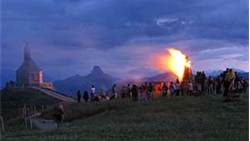
January
When I lived in Russia, my Russian friends used to try to get me to tell them all the things I didn’t like about living in their country. In particular, they seemed for some reason determined to get me to admit that I didn’t like the local city buses which came or didn’t come and were jam-packed solid at all times of the day or night. But when I finally gave in and told them the one thing I liked least about living in Russia, it had nothing to do with the buses. I told them I couldn’t stand all the stray dogs and cats living abandoned on the city streets.
To be sure, my Russian friends immediately admitted that this was indeed awful, but I think they used the Russian world awful “oojasna” more in the sense of annoying rather than the sense in which I meant it, as heart-rending and tragic.
Americans, it was understood, were squeamish about a lot of things, pets being just one of them. When my Russian cat, Pushkin, fell three stories to the ground from my apartment balcony, my friend Nadya could not understand why, if the cat didn’t have any broken bones, I wanted to stay home that evening to monitor him. “It’s not as if you live on the sixth floor,” I remember her saying.
I have traveled in other countries where cats and dogs run wild through the streets, abandoned, neglected: Greece, Spain, the Caribbean islands. All of these countries have up until recently known or still know great hardship. Their inhabitants have had to struggle for their own survival and have not had the time, or the inclination, or the luxury to worry about the dogs and cats that often live short and brutish lives around them.
I know that it is the mark of an affluent society to worry about domestic animals. I know that I am a spoiled product of such a society and that while my husband and I lavished all our love and attention upon one pampered animal, people and animals all over the world were going without, in my own country even, only minutes from where I live.
Yet, we did it anyway. We allowed ourselves to love one small creature more than any other. We lived with him, played with him, talked to him, held him, and looked forward with the greatest of pleasure to find him waiting at the front door whenever we arrived home.
And then one day he was not at this door, and our small, private, happy world collapsed.
Yet though he is gone, he also remains. He lingers in our rooms. His toy balls are where he left them under the table, the pillows that he used to lie on are still covered in his fur. In the mornings, we think we hear his paws upon the stairs. In the evenings, we imagine him warming his belly in front of the fire.
He never went out into the woods which surround our home, but he watched these woods carefully from his various perches: window sills, cat beds, stools. He watched the birds on the feeders and the squirrels rushing over the autumn lawns. He watched the deer, the crows, and the chipmunks. He watched the river shining through the trees.
His coat was silver.
If only you could find your way
From the river of chill flowers,
The forest of nothing to eat,
Back through the ice window
Back through the locked door of air.
–Margaret Atwood, “January,” 2007





Sorry about quicksilver. He was the luckiest and most loved cat in the world. The world was a better place with him in it, and I kno u and tony will remember him always. Mark
Dearest Linda,
It was very hard to read your post. Anyone who has lost a member of their family as indeed your beautiful cat was can relate to your tragedy. Bob and went through this some years ago and still are reluctant to mention his name. Such a senseless lost. We extend our deepest sympathy.
So sorry, Linda!
Oh Linda. There is nothing so sad as the loss of a dear fur friend. You were honored and privileged to share your home and your heart with this little (well, he wasn’t so little) fellow. Such a void they leave in our hearts and in our homes. I am truly sorry for your loss.
to loose one of these innocent, pure, loving beings truly breaks ones heart far deeper than one can expect it to break.
that little man will be missed, he was loved.
Losing a family member, especially a furry one, brings its own singular grief. Your little guy was a good friend to you and Tony, and I am so sorry for your loss. Thank you for sharing your remembrance of him.
They leave such imprints on our hearts. I am so sorry for your loss Linda.
I was lucky to have known such a joyful, silly, loving soul. I will forever remember his silly antics and playful eyes. His silver fluffy coat that I combed to fine perfection. I know I was just a small part of his life but I miss him terribly. I am sorry that you both have to suffer this loss. You will all be in my heart forever. Quicksilver is unforgettable!!!!
Wee are so sory for your loss. Wee now how you feel.Remember when wee lost Charly
Linda and Tony – I’m so sorry to hear about your loss.
Dear Linda,
I can feel so deep with you, because our cat oneday layed in front of our house…. A family member is gone…. Be strong and remember to him with a smile about the good time you had together…